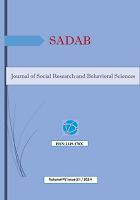Eğitimin Tarihsel Kökleri Bağlamında Öğretmenlik Mesleğinin Eleştirel Düşünme Becerisinin İncelenmesi
Examination of the Critical Thinking Skills of the Teaching Profession in the Context of the Historical Roots of Education
Author(s): Yasemin Şen, Şenol Şen, Kemal Garip, Evren DağlıSubject(s): Education, History of Education, Educational Psychology, Sociology of Education, Pedagogy
Published by: SD Yayınevi
Keywords: Historical Roots of Education; Teaching Profession; Critical Thinking Skills;
Summary/Abstract: Although the need for progressive skills of societies in the historical process is not new, skills such as “creativity”, “critical thinking”, “problem solving”, “cooperation ability, which are sufficient to be in only a small part of societies, are 21. in order to survive in the century, it is considered a kind of “universal literacy” and requires to be addressed in a more comprehensive and systematic way. These skills and competencies are more related to the needs of the developing economic and social development models than the production-based industrial model of the last century, to indicate that 21. they are called century skills and competencies. Economic change, which has been decisive on all economic developments in the world up to the present day and forms the basis of modern society, 18. it is the first industrial revolution that started with machine-based production in the century. Following the first industrialization movement, industrialization has become widespread rapidly with the use of electricity and the transition to mass production in the second industrial revolution. the process called the third industrial revolution, which has witnessed the development of information and communication technologies from the 1970s to the present, has enabled automation and digitization in production. Today, the transition to high technology, the communication of machines with each other via the Internet and increasing digitalization, artificial intelligence and the production of robots constitute the first application examples of the fourth industrial revolution we are in, which is called Industry 4.0. Capturing the opportunities offered by Industry 4.0 with information systems and related technologies depends on the change of the focus of education in parallel with these developments.
Journal: Sosyal Araştırmalar ve Davranış Bilimleri
- Issue Year: 10/2024
- Issue No: 21
- Page Range: 735-748
- Page Count: 14
- Language: Turkish

